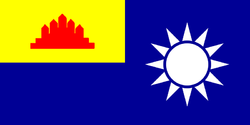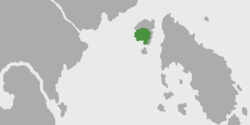Mailong
 | |
| Official language | Mandarin Chinese, Khmer, English |
|---|---|
| Capital | Angel (Tianshi) |
| Largest cities | New Mailong, Xizhou |
| Website | Website |
| Forum | N/A |
| Number of citizens | 1 |
| Number of active citizens | 1 |
| Date founded | August 2012 |
| Government | Constitutional Republic |
| Current leader | Yang Delun |
| Currency | Mailong Wen |
| National animal | Panda |
| National fruit/food | Amok |
| National drink | Bubble tea |
 | |
'Mailong, officially the Republic of Mailong is a nation situated on the southern part of the Idunn Isles, in the Keltian region of Micras. Founded in 2012, the second republic is the successor to the first Republic of Mailong, a nation based on the remains of the Kampongese rule of the Idunn isles, taking its name from a city from the Kampong era. Today, Mailong has an estimated population of around 1 500 000 people with the majority of Xinguoese and Kampongese descent.
Name
The name "Mailong" is derived from the city of Mailong, once a settlement on the isles during the Kampong rule. Despite the original Mailong now being under Stormark territory, the name lends itself to the official name recognised by the rest of Micras of the nation. Whilst the majority of the nation still refers to it as Mailong, the ethnic Xinguoese people of Mailong, who now account to the majority of the Mai people, consider the official name of the nation to be Mindao (民岛), which literally translates to the people's island, which now has more popular usage than the transliteration of "Meilong".
Intermicronationally, the nation is still known as Mailong; however its three letter abbreviation has been shortened to MDG, corresponding to the Xinguoese characters Mindaoguo (民岛国), signifying the dominance of the Xinguo community in the nation.
History (fictional)
It is not quite known how the Idunn isles were populated in its pre-historic era. After all, it was a land claimed by barbaric tribes, with no form of structure. However this all changed with the annexation of the isles to Menelmecar. The Menelmecar people were of Scandinavian origins and controlled the island for several decades, before suddenly leaving and restoring the isles to its Barbaric state.
The land didn’t take long to be claimed by another civilisation as the Grand Empire took control of the lands. But they followed suit in their predecessors, not having a stronghold on their isles and their influence died down. As the Grand Empire died down, it was the turn for the Kingdom of United Madland to colonise the region as the Grand Duchy of New Puerto Rico. Whilst they no longer remain on the isles, the Kingdom still remains on Micras – now formally known as the Empire of the Alexandrians, or more colloquially as the Purple Empire.
As we leave the barbaric eras and the struggles to enforce any influence on the isles, we go a few centuries further, where the first settlements and civilisations existed on the Idunn isles. It was the Dutch sector of Micronations to tighten their stronghold on the region, with the Red Antilles forming the city of Ghentenaire. Under the communist regime of the Red Antilles, Ghentenaire was the central settlement for collecting dyes.
Meanwhile the Idunn isles was under Red Antilles control, the first Micras orient revolution was occuring in Mainland Keltia, where a nation named Chine was politically divided into two. This was the foundations of the orient on Micras, with many people of Mailong claiming to have descended from this era. Whilst the political tensions were ongoing in Keltia, the Red Antilles were experiencing tense events with themselves, having engaged in intense fighting with the Anticans on their main soil. Despite the violence, it never reached to the isles as the Red Antilles held onto what we now call Mailong. Despite some of the territory being lost New Brannum, the Red Antilles managed to have significant influence on the islands for centuries.
With the decline of the Red Antilles, it was another Dutch sector nation who took over the territory, with the transfer of power going to Charlotta. Despite the change in power and government, the influence was more or less the same, although now lurking to the east was a different civilisation – Stormark. It is the Storish in this modern day, who now govern the northern part of the Idunn isles, with the Mailong people settling in the South.
During this period of administration, the bitter war within Chine came and faded. Victory to the democrats ended in the civilisation fading, eventually to the extent of returning to the past barbaric form. It wasn’t long until there was a renaissance of the Keltian orient, with Middle Korea, Chi Nam, Taesong, Kampong and Xinguo all emerging. The latter three are the most influential civilisations that have come together and forged Mailong today.
Kampong, a communist state formed by Khmer settlers first set foot onto the Idunn isles, as the ethnic Khmers formed several settlements, notably Svaylong and Mailong, the name given to this republic despite the city now lying in the northern part of the isles under Storish governance. As the orient once again declined, we saw mass immigrations. Whilst the Xinguoese and Kampongese lived as barbarians in their own land, ethnic Taesongeans fled north of Keltia to Nova English Korea. The south of the Idunn Isles was claimed by Beaugians.
With the Storish controlling what was the Kampongese land, and Beaugian effectively governing the south, the Kampongese were nowhere to be seen apart from being the aborigine minority on the isles. However with Juclandia and Uantir claiming the former lands of Kampong and Xinguo, the mainland Keltian barbarics decided to pounce on the Beaugian decline on the isles. Following generations of being the anonymous minority and barbarics of Keltia, the ethnic Xinguoese decided to cross the ocean, overflooding the south of the Idunn isles. Taking the ruins of the city of Angel, the Xinguoese decided to settle and redevelop, taking the territory of their own. They were soon joined by a minority of Kampongese and Taesongean immigrants, and despite unfair treatment at first, the Xinguoese eventually came to recognition of the other 2 ethnic immigrants, as well as recognising the aborigine Kampongese tribes that were living there. This was the formation of Mailong. And Mailong will stand strong. Through hard work and determination, the republic can become a great country.
Whilst many people will see this as a temporary move, the Mailong people will see this as a new beginning. There is a divide in Mailong however between the nationalists and reunionists. Nationalists believe that the islands are its nation in its own right, whereas the reunionists aim for the Mailong people to reclaim its land to re-establish their previous nations.